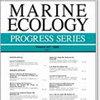Aerobic dive limit in short-finned pilot whales Globicephala macrorhynchus: an assessment of behavioral criteria
IF 2.1
3区 环境科学与生态学
Q2 ECOLOGY
引用次数: 0
Abstract
ABSTRACT: Aerobic dive limits (ADLs) are a useful paradigm for assessing marine mammal diving ability. Given the allometry of total body oxygen stores and metabolic rate, larger animals should have increased diving capacities and thus elevated ADLs. The short-finned pilot whale Globicephala macrorhynchus is a deep-diving species with pronounced sexual size dimorphism, and individuals are regularly found in size-mixed groups. Therefore, we asked how body size constrains dive durations in this species and whether behavioral ADL (bADL), estimated as the 95th percentile of dive duration, is a useful measure of physiological ADL. We analyzed 30169 dives from 45 animals tagged with satellite-linked recorders off Cape Hatteras, North Carolina, and Jacksonville, Florida, USA, and determined a species-level bADL of 18.8 min and individual bADLs ranging from 13.9 to 22.1 min. To assess the influence of size on bADL, we estimated the body lengths of 19 whales from dorsal fin measurements. Body length did not fully explain intraspecific bADL variation, but similar dive distributions and lower bADL variance between animals tagged together indicated a potential effect of group membership. Moreover, individuals in Cape Hatteras had a significantly lower median bADL than those in Jacksonville, suggesting location may influence dive durations. These results indicate the potential impact of social and location-specific factors on bADL estimates in a deep-diving, sexually dimorphic species.短鳍领航鲸(Globicephala macrorhynchus)的有氧潜水极限:行为标准评估
摘要:有氧潜水极限(ADLs)是评估海洋哺乳动物潜水能力的有用范例。鉴于体内氧气储存总量和新陈代谢率的异构关系,体型较大的动物应该具有更强的潜水能力,从而提高有氧潜水极限。短鳍领航鲸(Globicephala macrorhynchus)是一种深潜物种,具有明显的性别体型二形性,个体经常出现在体型混杂的群体中。因此,我们想知道体型如何限制该物种的潜水持续时间,以及行为 ADL(bADL)(估计为潜水持续时间的第 95 百分位数)是否是衡量生理 ADL 的有用指标。我们分析了在美国北卡罗来纳州哈特拉斯角和佛罗里达州杰克逊维尔附近海域用卫星链接记录器标记的 45 只动物的 30169 次潜水,确定物种水平的 bADL 为 18.8 分钟,个体的 bADL 为 13.9 至 22.1 分钟不等。为了评估体型对bADL的影响,我们通过背鳍测量估算了19头鲸鱼的体长。体长并不能完全解释种内 bADL 的变化,但相似的下潜分布和较低的 bADL 变异表明,群体成员资格可能会产生影响。此外,哈特拉斯角的个体的 bADL 中位数明显低于杰克逊维尔的个体,这表明地点可能会影响潜水持续时间。这些结果表明,在深潜、性双态的物种中,社会和特定地点因素对bADL估计值的潜在影响。
本文章由计算机程序翻译,如有差异,请以英文原文为准。
求助全文
约1分钟内获得全文
求助全文
来源期刊

Marine Ecology Progress Series
环境科学-海洋学
CiteScore
5.30
自引率
8.00%
发文量
238
审稿时长
3 months
期刊介绍:
The leading journal in its field, MEPS covers all aspects of marine ecology, fundamental and applied. Topics covered include microbiology, botany, zoology, ecosystem research, biological oceanography, ecological aspects of fisheries and aquaculture, pollution, environmental protection, conservation, and resource management.
 求助内容:
求助内容: 应助结果提醒方式:
应助结果提醒方式:


